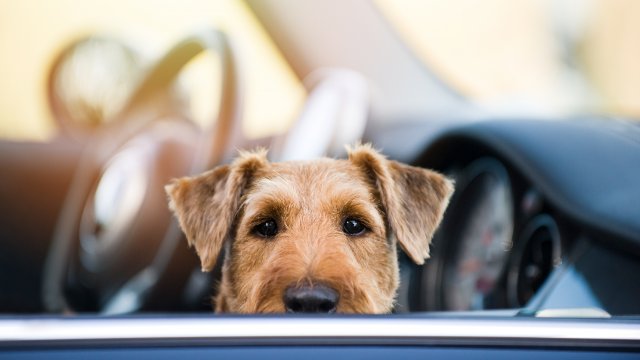Is it just motion sickness, or could it be something more?
Our dogs are important members of our families, so it’s only natural we want them to join us wherever we go. Whether that means a summer road trip or just errands around town, however, car travel can sometimes have some messy side effects for our pooches.
Trouble in Motion
Dogs may show human-like signs of motion sickness, like vomiting and dry heaving, along with some other, more pup-oriented symptoms, including excessive lip-licking, panting, shaking, and inactivity. But what may look like a bout of carsickness is often less about movement and more about something we humans feel too: stress.
This is not always the case. Some puppies may not have the fully developed ear structures that help them balance, which can lead to early bouts of motion sickness they often outgrow. But dogs of any age may also associate car rides with traumatic events – maybe they were abandoned at a shelter or remember being sick in the car as a pup. This association between cars and trauma can lead to lingering anxiety that needs to be addressed.
Learning to Love the Car
Conditional training is the most effective way to address the anxiety at the root of most canine car concerns. Start small: work to create a better relationship between your pup and the car with the engine turned off, even if it’s just for a few minutes at a time. Spend time in the stationary vehicle and use stress-free activities like feeding, chewing on a favorite bone, or brushing (if this is relaxing for your pup) to build up positive associations.
Once the car itself is no longer a source of stress, progress from sitting in the unmoving car to sitting in the car with the ignition turned on. Next, take short trips around the block, to your pup’s favorite pet park, or to another destination with your pet enjoys. Over time, you can introduce longer distances and unfamiliar places.
Other Ways to Help
Pet parents can also make small changes to make car rides more comfortable for their pups. A properly secured travel crate helps your canine companion feel safe, prevents them from feeling overwhelmed by the scenery whizzing by, and prevents them from being thrown around (and injured, or worse) in case of an accident. Frequent stops are a must on longer trips, and a quick walk or play before leaving and upon arrival can help minimize stress.
Training
As close as we are with our pups, they can’t tell us how they are feeling. It's on us humans to figure out what’s ailing them – and how to help. Basic conditional training can work wonders with creating positive associations with the car and make the anxiety at the root of what seems like motion sickness disappear.
Bark Busters is always available to help diagnose the issue and create a plan to help.
Contact us today and live a happier life together with your dog!
